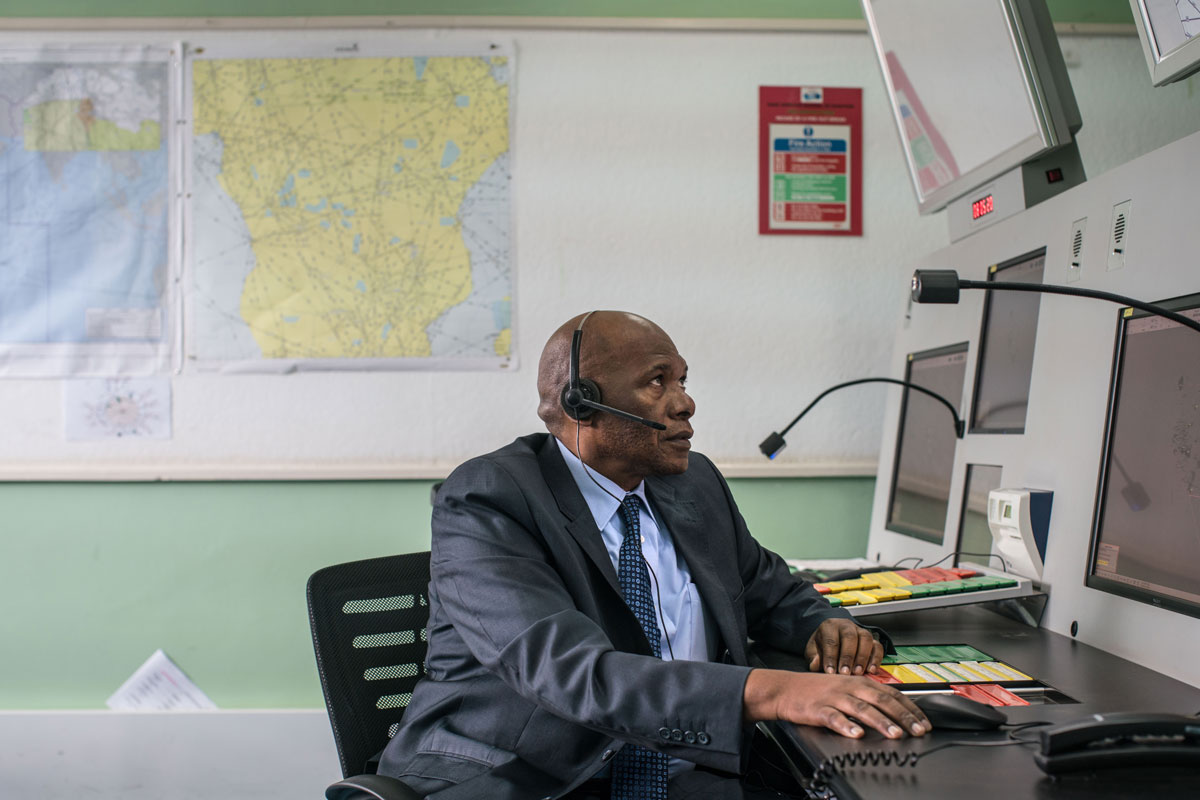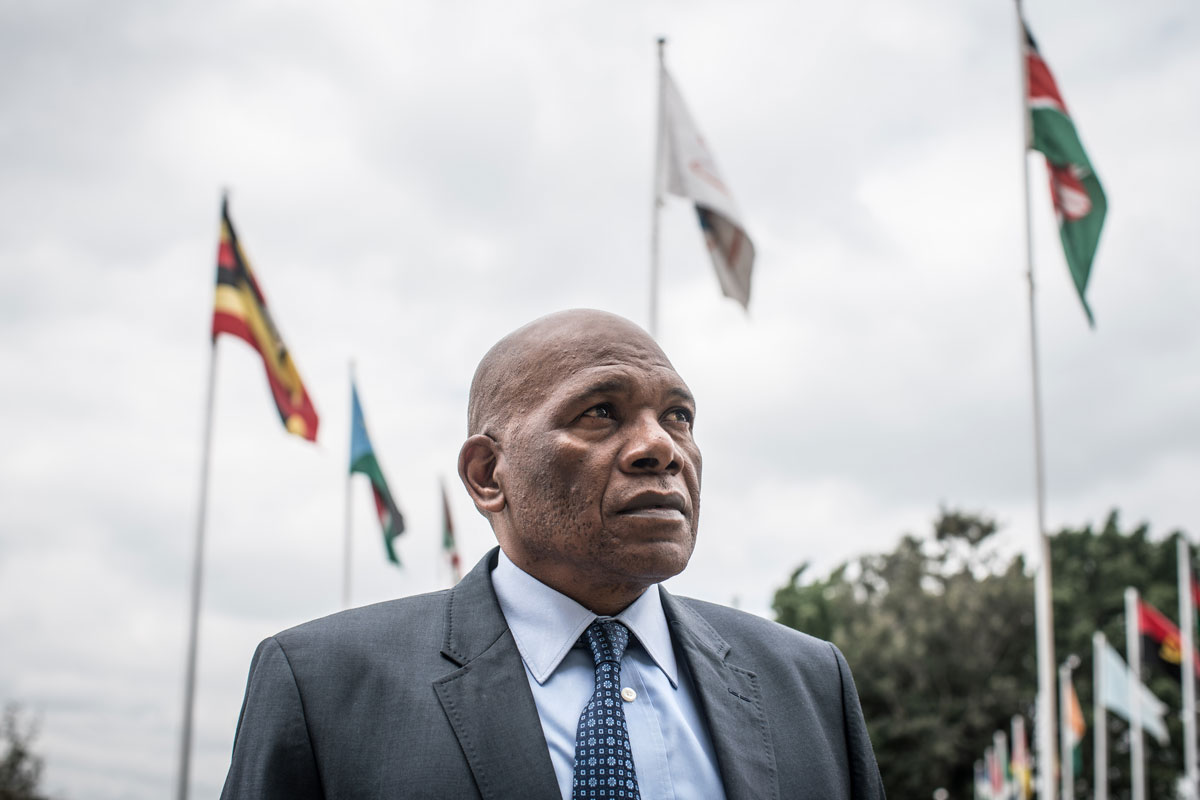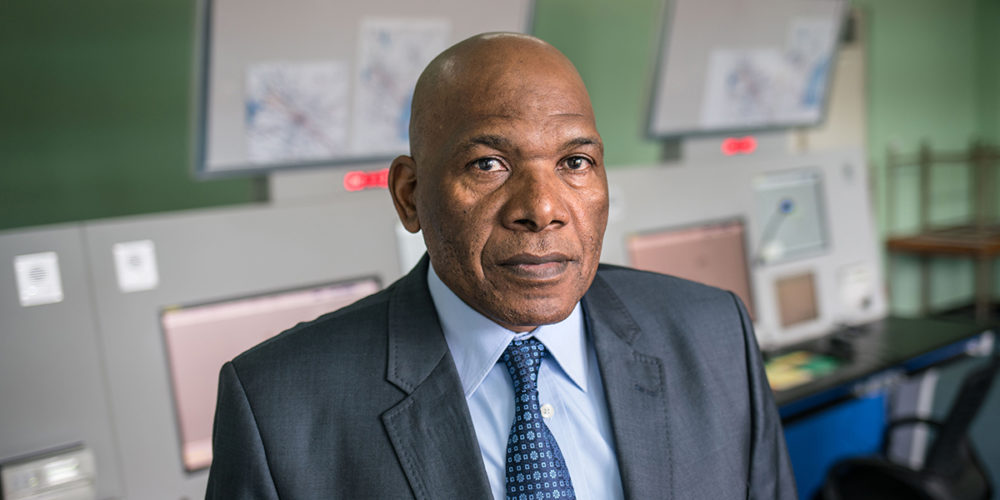Seboseso “Sebo” M. Machobane (’94, PC) came to Embry-Riddle to become a pilot, but his people skills and his passion for challenging himself drew him back to his air traffic management roots.
Based in Nairobi, Kenya, Machobane is a regional officer for air traffic management and search and rescue for the International Civil Aviation Organization (ICAO), a United Nations agency. In his current job he promotes ICAO policies, standards, recommended practices and air navigation plans across 24 member states in the Eastern and Southern subregion of Africa.
Machobane says his greatest fear is succumbing to “indifference, when excellence can be achieved.” His fight against this fear fuels his efforts to improve the safety and efficiency of aviation in his home continent.
Reshaping the Airspace
And, he’s making headway. Machobane is credited with establishing more than 100 new efficient and user-preferred route trajectories for the Africa-Indian Ocean regional air traffic services (ATS) route network, which includes the continent of Africa and its neighboring islands, and working to get a new ATS route network approved. The new route network reduces the former by 4,797 nautical miles and cuts carbon dioxide emissions by an estimated 144 million metric tons. Machobane’s relentless effort to develop the network earned him the unofficial title of “Mr. Airspace” in Africa.
“It took quite a while, because first of all, I had to get an agreement from all the countries involved,” says Machobane, who spent five years on the ATS route project, which received final approval in 2015. At times, tensions were high among the various country representatives, he says. “Sometimes the new routes would result in less traffic for certain airspaces, compared to what they used to get,” he explains.
“I enjoy looking back and seeing the improbable achieved.”
There was a lot of red tape to get the new route plans accomplished, but the impact was huge. Some flight routes are shorter by 200 miles, Machobane says. “When multiplied over the course of a day, flight changes like that can make or break an airline. There are lots and lots of savings,” he says.
It wasn’t easy, though. Machobane had to deal with high staff turnover in other countries, a lack of follow through, differing priorities and meager resources.
“Aviation in many countries is not a priority; if they have a penny, you can be sure it is not going anywhere to aviation,” Machobane says. “Or they have different priorities. You may say invest in safety, but there is no big return there.”
He accepts that politics and bureaucracy are a part of the ongoing process to make needed improvements, but he doesn’t let them defeat him. “I can be pretty stubborn,” he admits. “If I think something is going to work, I won’t back off. People know this guy is never going to give up.”

Taking Flight
That determination has driven Machobane throughout his career. South African but raised in Lesotho, he became interested in aviation as a child, after a pilot showed him his Cessna airplane during a visit to an airport.
“I was 8. It was fascinating,” recalls Machobane. “I always wanted to do something not many people get to do.”
His plans to become a pilot did not initially work out. He was trained in Nigeria in air traffic control in 1979. He then went on to work as an air traffic controller for more than a decade in Lesotho.
Unable to kick his desire to fly, Machobane was in his mid-30s with a wife and two young children when he enrolled at Embry-Riddle in 1991. Attracted by the multi-engine flight program offered at the Prescott Campus, he relocated halfway across the world and sacrificed the comforts of home and family to earn an aeronautical science degree. “It was something that I always wanted to do. So I told myself, I was going to work like crazy and get my degree done,” he says.
Dave Roy (’88, PC), Machobane’s first flight instructor at the Prescott Campus, remembers he was a model student. “He always kept his focus, even though his family was 10,000 miles away in Lesotho,” Roy says.
One of Machobane’s biggest mentors, Bob Sweginnis, was also his academic adviser at Embry-Riddle. An aerobatic pilot, Sweginnis died in an airplane accident in 2004. “I really appreciate him for imparting his knowledge,” Machobane says of Sweginnis. “The whole science behind flight—this guy could explain it in the best way that I could understand it.”
Although he does not fly himself anymore, Machobane says the education he received at Embry-Riddle gave him a wide-ranging knowledge of aviation that he uses daily. “I’ve been on both sides, so I have a very comprehensive understanding of both [piloting and air traffic management],” he says.
Committed to Improving African Aviation

After graduating from Embry-Riddle, Machobane worked as a flight instructor at Central Missouri State University while earning an M.S. in Aviation Safety and an M.S. in Industrial Safety Management.
He then returned to Africa, where he became the commissioner of civil aviation for South Africa, before joining ICAO in 2006.
Roy, who is now the director of communications and safety at Guidance Aviation in Prescott, has followed his former student’s career at ICAO with pride. Machobane has overhauled the African route network to make it more efficient, mediated airspace disputes, analyzed air traffic control incidents and improved airspace safety, he says. He also helped initiate a process of education and training leading to the implementation of Performance-Based Navigation. “Sebo represents an exceptional level of commitment to the aviation and aerospace industry,” Roy says.
As he reflects on his career, Machobane says he is happy to have achieved positive change for aviation in Africa. “What I enjoy most are the results. That is the most satisfying thing,” Machobane says. “I enjoy looking back and seeing the improbable achieved.”
Editor’s Note: Machobane is the recipient of the 2015 Embry-Riddle Alumni Achievement Award.
